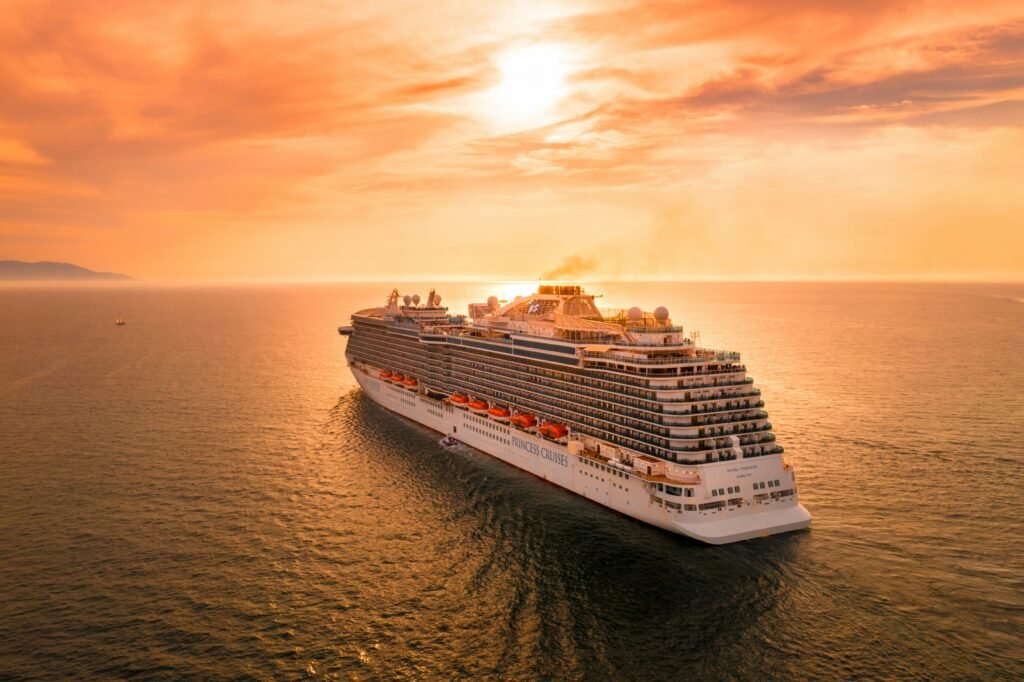
Are you planning to take a cruise this summer? Before you start packing, it’s essential to know which items are prohibited to avoid any unnecessary hassles. Lucy, a crew member for a Caribbean cruise line, shared her insights on the YouTube channel @CruisingAsCrew, explaining that there are some surprising items that can cause problems if you bring them in your luggage. Here’s a detailed list of those items you should leave at home.
Table of Contents
Inflatable Items and Fans
Why Inflatable Items Are Not Allowed
Inflatable floaties might seem like a fun idea for the ship’s pools, but they are often not permitted. Why? Space is limited on a cruise ship, and large inflatable items can cause congestion and safety hazards. Moreover, these items can obstruct pathways and become a nuisance during emergencies.
The Issue with Fans
Large fans are another item to leave at home. While they might help keep your cabin cool, they can interfere with the ship’s electrical system, posing potential safety issues, including fire hazards. Cruise ships have stringent safety regulations, and bringing items that could compromise this is not worth the risk.
Making Smart Choices
Instead of bringing these problematic items, think about alternatives. For cooling, consider bringing a small, battery-operated fan that complies with cruise regulations. Always check the cruise line’s specific policies regarding any items you’re unsure about to ensure a smooth boarding process.

Electrical Appliances
Fire Risks on Board
Certain electrical appliances like coffee makers, toasters, and irons are strictly prohibited. These items pose a significant fire risk, which is a critical danger in the confined environment of a cruise ship. Most ships provide these amenities in designated areas, so you can still enjoy your comforts without the risk.
Utilize Onboard Services
Instead of packing these potentially dangerous items, utilize the services provided on board. Many cruise lines offer laundry and ironing services, and most cabins are equipped with coffee makers and other small appliances that meet safety standards.
Benefits of Following the Rules
By adhering to these rules, you ensure your safety and the safety of others on the ship. Plus, using onboard services can enhance your cruise experience by allowing you to travel lighter and worry-free. It’s a small adjustment that can make a big difference in your trip’s overall enjoyment.
Alcoholic Beverages
Strict Alcohol Policies
Alcohol is a particularly sensitive topic on cruises. Lucy explains that alcoholic beverages brought on board from outside are confiscated upon boarding and returned at the end of the cruise. This policy encourages passengers to consume alcohol in the ship’s bars and restaurants, which are controlled environments.
Exceptions to the Rule
However, there are exceptions. On the cruise line where Lucy works, you are allowed to bring two bottles of wine or champagne on the first day of the cruise. This allowance does not extend to other stops along the journey, so plan accordingly if you wish to enjoy a special bottle.
Planning for a Great Experience
Knowing these rules ahead of time can help you plan better. If you enjoy a particular drink, find out if the ship’s bars can provide it or if they have a similar alternative. This ensures you can still enjoy your favorite beverages without violating the cruise line’s policies.

Illegal Drugs and Other Prohibited Items
No Tolerance for Illegal Substances
As expected, illegal drugs are completely banned on any cruise ship. Bringing illegal substances not only endangers your safety but can also lead to severe legal consequences. Always abide by local laws and cruise regulations to ensure a smooth journey.
Navigation and Safety Concerns
There are also restrictions on the use of walkie-talkies and drones. These items can create navigation and safety issues, potentially interfering with the ship’s communication systems. Additionally, weapons, even replicas, are not allowed due to the fear and potential panic they could cause among passengers.
Being Prepared
To avoid any issues, it’s crucial to read through the prohibited items list provided by your cruise line. Being informed helps you pack smarter and ensures a stress-free boarding process. Always err on the side of caution and leave questionable items at home.
Other Specific Items
Handling Sensitive Items
If you intend to bring the ashes of a loved one to scatter at sea, special preparations are necessary. You must carry the death and cremation certificates and inform the crew of your intentions so they can assist you appropriately. This ensures a respectful and smooth process.
Plan Ahead
Being aware of these restrictions can save you from significant hassle at the port. Check the specific policies of your cruise line before packing, as regulations can vary. Make sure all sensitive items are properly documented and declared to avoid any misunderstandings.
Respecting Regulations
Understanding and respecting the regulations of your cruise line not only helps you avoid trouble but also ensures that your trip proceeds smoothly. Proper planning can make a significant difference in your cruising experience, especially with sensitive items.
Keeping Your Luggage Organized
Benefits of Organized Packing
Organized packing helps you find items quickly and ensures you don’t accidentally pack prohibited items. Consider using packing cubes or organizers to keep your belongings tidy and accessible. This method also helps you manage your space efficiently, allowing you to pack more smartly.
Items to Pack Instead
Focus on packing items that enhance your cruise experience, like comfortable clothing, swimwear, and personal care items. Leave space for souvenirs and items you might purchase during your trip. Avoid overpacking by selecting versatile clothing that can be worn in multiple settings.
Efficient Packing Tips
Roll your clothes instead of folding them to save space and reduce wrinkles. Use shoe bags to keep footwear separate from clothing. Make a checklist of essentials to ensure you don’t forget anything important while avoiding prohibited items.
What to Expect During Security Checks
The Boarding Process
During boarding, security checks are thorough. All luggage is scanned, and prohibited items are confiscated. Knowing what to expect can help you prepare and avoid delays. Familiarize yourself with the boarding procedure to make the process smoother and faster.
Tips for Smooth Security Checks
To make the process smoother, label your luggage clearly and keep essential documents like passports and boarding passes easily accessible. Cooperate with security personnel and follow their instructions. Arrive early to give yourself plenty of time to go through security without stress.
Common Mistakes to Avoid
Avoid packing last-minute items that could be prohibited. Double-check your luggage for any items that might have been forgotten or accidentally included. Being prepared and organized helps you breeze through security checks and start your vacation on a positive note.
Understanding Cruise Ship Regulations
Why Regulations Are Strict
Cruise ship regulations are strict for a reason: safety is the top priority. Understanding and complying with these rules ensures a safe and enjoyable journey for everyone on board. These regulations are designed to protect both passengers and crew from potential hazards.
Commonly Overlooked Rules
Some rules might not be immediately obvious, like restrictions on certain foods or medical equipment. Always check with your cruise line beforehand to avoid surprises. For instance, some cruises might restrict certain fruits or homemade foods due to pest control regulations.
Staying Informed
Regularly check for updates from your cruise line, especially if there have been recent changes in policies. Staying informed ensures you are always prepared and compliant with the latest rules, making your cruise experience more enjoyable and stress-free.

Ensuring a Safe and Enjoyable Cruise
Importance of Compliance
Complying with the cruise ship’s rules and regulations is essential for your safety and the safety of others. It also ensures that you can fully enjoy all the amenities and activities on board. Adhering to these guidelines helps maintain a harmonious and enjoyable environment for everyone.
Final Preparations
Before you embark, double-check your packing list and remove any prohibited items. Ensure that you have all necessary travel documents and that your luggage is securely packed and labeled. Being thoroughly prepared helps you avoid last-minute stress and enjoy your vacation from the moment you board.
Embrace the Experience
Embracing the experience means being open to the unique environment of a cruise ship. Following the rules not only ensures safety but also allows you to make the most of your time on board, from enjoying the diverse activities to relaxing with peace of mind.
Conclusion
These restrictions are designed to maintain the safety and well-being of all passengers on board. Before packing for a cruise, make sure to review the specific policies of the company you are traveling with. This will help you avoid any issues during boarding and allow you to fully enjoy your trip without any setbacks. Remember, safety is always the number one priority at sea. Enjoy your cruise!

FAQs
What items are prohibited on most cruise lines?
Commonly prohibited items include electrical appliances like toasters and irons, inflatables, large fans, illegal drugs, weapons (even replicas), and alcoholic beverages brought from outside, except for certain exceptions like two bottles of wine or champagne on the first day.
Can I bring a small fan or a travel iron?
Typically, small, battery-operated fans that comply with cruise regulations are allowed, but travel irons are generally prohibited due to fire risks. Always check with your specific cruise line for their detailed policies.
What should I do if I need to bring medication or medical equipment?
Always inform your cruise line in advance if you need to bring medication or medical equipment. Carry a doctor’s note and ensure that all medications are in their original, clearly labeled containers. Check if there are any restrictions or necessary declarations to make beforehand.
Can I bring my own alcohol on board?
Most cruise lines have strict policies regarding bringing alcohol on board. Usually, outside alcohol is confiscated upon boarding and returned at the end of the cruise. Some lines allow two bottles of wine or champagne on the first day. Check your cruise line’s specific rules.
Are drones allowed on cruise ships?
Drones are generally prohibited on cruise ships because they can interfere with navigation and safety. Always check with your cruise line for their specific policies regarding drones and other aerial devices.
What types of electrical appliances are banned?
Electrical appliances such as coffee makers, toasters, irons, and kettles are typically banned due to fire risks. Cruise ships have stringent safety regulations to prevent fires and ensure passenger safety.
Can I bring food on board?
Most cruise lines have restrictions on bringing food on board. Homemade food and perishable items are usually not allowed. Non-perishable, pre-packaged snacks are often permitted, but it’s best to check with your cruise line for specific guidelines.
What are the rules for bringing pets?
Pets are generally not allowed on cruise ships, with the exception of service animals. Each cruise line has its own policies regarding service animals, so it’s important to check these policies in advance and notify the cruise line of your needs.
Is smoking allowed on board?
Smoking policies vary by cruise line. Most have designated smoking areas and prohibit smoking in cabins and on balconies. Some lines also ban electronic cigarettes and vaping outside designated areas.
Are walkie-talkies allowed on cruise ships?
Walkie-talkies are often restricted or prohibited because they can interfere with the ship’s communication systems. Check with your cruise line for their specific policies on communication devices.
Can I bring sports equipment on board?
Sports equipment such as surfboards, bicycles, and large fishing gear are usually restricted due to space and safety concerns. Some cruise lines offer rentals or have specific sports facilities on board.
What happens if prohibited items are found in my luggage?
If prohibited items are found during security checks, they will be confiscated and returned at the end of the cruise. Some items may be permanently confiscated if they pose a significant safety risk.
Can I bring a power strip for additional outlets?
Power strips without surge protectors are often allowed, but those with surge protectors are typically banned due to fire risks. Always check with your cruise line for their specific policies regarding electrical devices.
What should I do if I want to scatter ashes at sea?
If you plan to scatter ashes at sea, you must carry the death and cremation certificates and inform the cruise line in advance. The crew will provide guidance and assist with the process to ensure it’s handled respectfully.
Are there restrictions on electronic devices?
While most personal electronic devices like phones, tablets, and laptops are allowed, larger appliances and those with heating elements are restricted. Always check your cruise line’s specific guidelines for electronic devices.
Can I bring my own scuba gear?
Some cruise lines allow you to bring your own scuba gear, but tanks and weights are often prohibited for safety reasons. It’s best to rent these items from the cruise line or dive shops at your destinations.
What personal care items should I pack?
Personal care items such as toiletries, sunscreen, and medications should be packed in your carry-on luggage. Ensure that any liquids comply with the cruise line’s policies regarding liquid items.
Are there weight limits for luggage?
Yes, most cruise lines have weight limits for checked and carry-on luggage. It’s important to check these limits in advance to avoid extra fees or having to repack your belongings.
Can I bring a stroller or wheelchair?
Strollers and wheelchairs are usually allowed, but it’s important to notify the cruise line in advance to ensure that there are no specific restrictions and to make arrangements for accessible accommodations if needed.
How should I pack for excursions?
When packing for shore excursions, bring versatile clothing, comfortable shoes, and any necessary gear specific to your activities. A small daypack for carrying essentials like water, snacks, and a camera is also recommended. Check excursion details for any special requirements.
What are the guidelines for carrying cash or valuables?
It’s advisable to carry a minimal amount of cash and valuables. Use the ship’s safe to store important items securely. Keep a record of all valuable items you bring, and ensure they are insured if necessary.
By familiarizing yourself with these frequently asked questions, you can ensure a smoother, more enjoyable cruise experience. Always check with your specific cruise line for their detailed policies and guidelines.




















